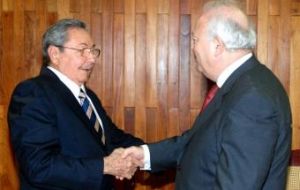MercoPress. South Atlantic News Agency
Cuban greetings for 2010: tighten your belts, it’s bad and it’s getting worse
 Raul Castro admitted to Spanish Foreign Secretary the situation was “very delicate”
Raul Castro admitted to Spanish Foreign Secretary the situation was “very delicate” Cuba is going through one of its cyclical “hard moments” but this time the lack of foreign currency is forcing draconian cuts in food subsidies, public utilities and other services taken for granted. The media repeatedly calls on the population to “tighten belts” because in 2010 restrictions are “for worse”.
Foreign trade in the nine months of this year has contracted 36%, and 80% on the imports side in a country which buys most of its food overseas. Imports in 2008 totalled 14 billion USD and only 4 billion USD so far this year. The “rations” booklet which helps Cubans acquire some staples in government stores is being phased out as well as the “popular dinning halls” that feed millions at rock bottom prices.
The situation is described as “extremely serious” which has been confirmed by foreign diplomats in Havana and hundreds of foreign businesspeople who are unable to transfer funds from Cuban banks to the countries from where merchandise was shipped.
Allegedly the sum involved is close to 600 million US dollars half of which belonging to Spanish businessmen reports the Madrid press.
President Raul Castro during a recent visit of Spanish Foreign Affairs minister Miguel Angel Moratinos admitted the situation was “very delicate”. He added Cuba will honour its commitments but “not immediately” and a “calendar of payments” would have to be agreed.
According to Spanish economists the Cuban economy this year is set to contract following several years of robust expansion: in 2006, 12.1%; in 2007, 7.3% and 4.3% in 2008. For 2009 the original target was 6% but Cuban officials have admitted a GDP contraction of 1.8%.
According to the Cuban government the situation can be attributed to global recession; the fall in Cuban exports international prices while food and fuel which the island imports have soared; the aftermath of last year’s hurricanes which were equivalent to a 20% GDP loss and the US trade embargo. However not a word is dedicated to “inefficiency” and the lack of reforms to boost productivity.
The practical side of these measures can be seen at government stores, virtually empty and the little there is, is beyond the purchasing power of average Cubans. Prolonged blackouts have become the norm with a strict power rationing system in every province and in every company. Government offices are banned from using air conditioners and companies that do not supply foreign currency run the risk of being shut down.
Meantime the subsidies system and social benefits are rapidly being pruned. The elimination of the “popular dinning halls” which was tested in several ministries is to be extended to the 24.500 food outlets in all the country, which could represent savings of 350 million USD.
At the beginning of November beans and potatoes were eliminated from the ration booklet and government stores, meaning Cubans must purchase them in the open markets.
Cuban Vice-president Ricardo Cabrisas admitted to a European Union cooperation delegation that by next year the only free benefits left will be those enshrined in the Constitution: education and health services.




Top Comments
Disclaimer & comment rules-

Read all commentsViva una Cuba Libre!
Nov 28th, 2009 - 12:00 am 0Commenting for this story is now closed.
If you have a Facebook account, become a fan and comment on our Facebook Page!